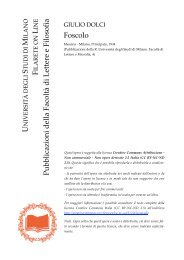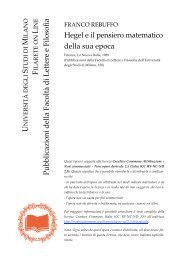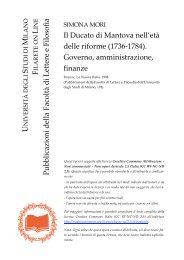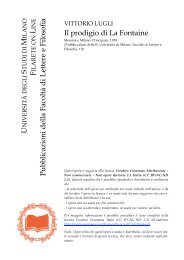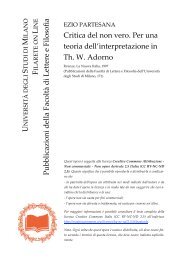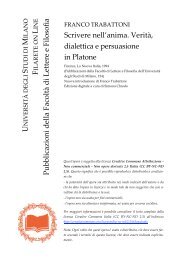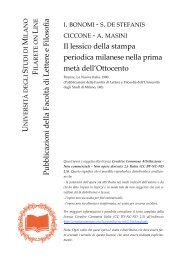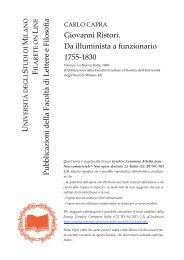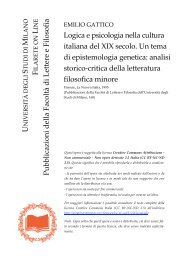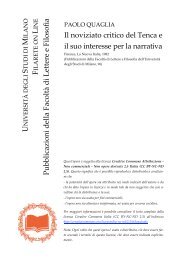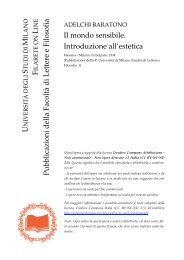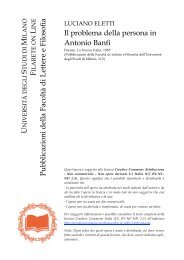Dialoghi sulla religione naturale - Studi umanistici Unimi - Università ...
Dialoghi sulla religione naturale - Studi umanistici Unimi - Università ...
Dialoghi sulla religione naturale - Studi umanistici Unimi - Università ...
You also want an ePaper? Increase the reach of your titles
YUMPU automatically turns print PDFs into web optimized ePapers that Google loves.
LA PARTE DEL LETTORE 77<br />
Se il discorso di Filone è ad lectorem, ad lectorem, non dimenti<br />
chiamolo, è innanzitutto l'argomentazione di Cleante. Cleante infatti<br />
sostiene che il mondo è un manufatto meccanico, modellato però su un<br />
manufatto particolare e insieme esemplare di tutti i manufatti: il libro.<br />
All'inizio della III parte dei Dialogues, Cleante, messo alle corde nella<br />
parte precedente da Filone, contrattacca con un discorso che rende Fi<br />
lone « un po' imbarazzato e confuso ». Filone esita a rispondere, ma<br />
per sua fortuna Demea interviene nella discussione e lo salva. Questi<br />
spiega che l'argomentazione di Cleante, che avrebbe messo fuori gioco<br />
Filone, possiede molta forza perché è « familiare ». Vediamo qual è<br />
il punto tanto formidabile sollevato da Cleante. Immaginiamo, dice<br />
Cleante, che i libri si riproducano per generazione, come i vegetali e gli<br />
animali, e che parlino tutti una stessa lingua. E supponiamo di entrare<br />
in una biblioteca piena di tali libri vegetali o animali. Ora, che cosa ci<br />
sarebbe di più assurdo del negare che il libro capostipite, da cui discen<br />
dono tutti quelli che adesso sentiamo parlare, ragionare, ecc., sia stato<br />
scritto secondo un progetto razionale? 10 .<br />
La supposizione che i libri siano animali o vegetali non dovrebbe<br />
10 « But to bring thè case stili nearer thè present one of thè universe, I shall<br />
make two suppositions, which imply not any absurdity or impossibility. Suppose,<br />
that there is a naturai, universa!, invariable language, common to every individuai<br />
of human race; and that books are naturai productions, which perpetuate themsel-<br />
ves in thè same manner with animals and vegetables, by descent and propagation.<br />
Several expressions of our passions contain a universal language: Al! brute ani-<br />
mais have a naturai speech, which, however limited, is very intelligible to their<br />
own species. And as there are infinitely fewer parts and less contrivance in thè<br />
finest composition of eloquence, than in thè coarsest organized body, thè propa<br />
gation of an Iliad or Aeneid is an easier supposition than that of any plant or ani-<br />
mal.<br />
Suppose, therefore, that you enter into your library, thus peopled by naturai<br />
volumes, containing thè most refined reason and most exquisite beauty: Could<br />
you possibly open one of them, and doubt, that its originai cause bore thè stron-<br />
gest analogy to mind and intelligence? When it reasons and discourses; when it<br />
expostulates, argues, and enforces its views and topics; when it applies sometimes<br />
to thè pure intellect, sometimes to thè affections; when it collects, disposes, and<br />
adorns every consideration suited to thè subjcct: could you persist in asserting,<br />
that ali this, at thè bottom, had really no meaning, and that thè first formation of<br />
this volume in thè loins of its originai parent proceeded not from thought and<br />
design? Your obstinacy, I know, reaches not that degree of firmness: Even your<br />
scepticaì play and wantonness would be abashed at so glaring an absurdity »<br />
fpp". 189-190).



